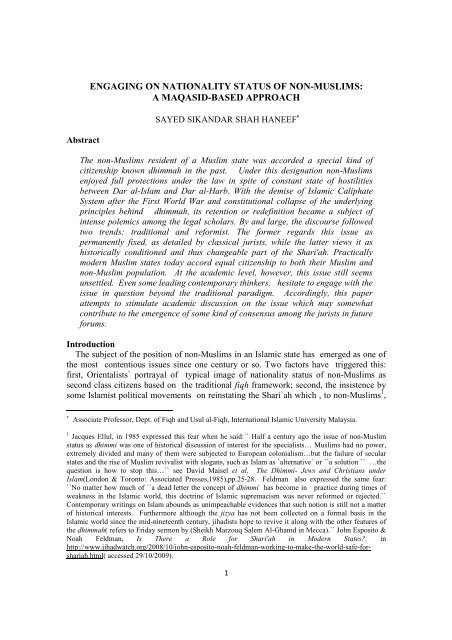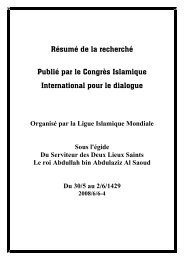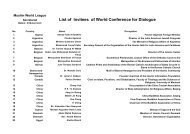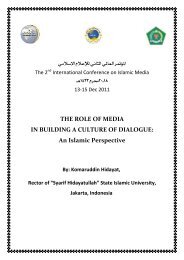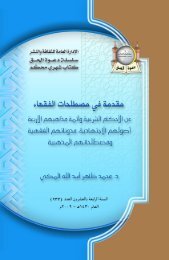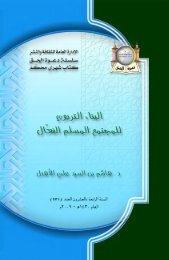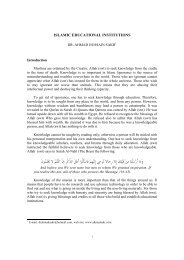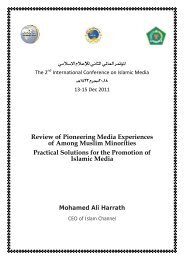You also want an ePaper? Increase the reach of your titles
YUMPU automatically turns print PDFs into web optimized ePapers that Google loves.
eligion publicy nor convert anyone to it. We shall not prevent any of our kinfrom entering Islam of they wish it. We shall show respect towards theMuslims, and we shall rise from our Seats when they wish to sit. We shall notseek to resemble the Muslims by imitating any of their garments, theqalansuwa [ cap ] , the turban, footwear, or the parting of the hair. We shall notspeak as they do, nor shall we adopt their kunyas [ surnames ]. We shall notMount on saddles, nor shall we gird swords nor bear any kind of arms norCarry them on our persons. We shall not engrave Arabic inscriptions on ourseals. We shall not sell fermented drinks. We shall not clip the fronts of ourheads. We shall always dress in the same way wherever we may be, and weshall bind the zunar [ waist belt ] round our waists. We shall not display ourcrosses or our books in the roads or markets of the Muslims. We shall useclappers in our churches only very softly. We shall not raise our voices whenfollowing our dead. We shall not show lights on any of the roads of theMuslims or in their markets. We shall not burry our dead near the Muslims. Weshall not take slaves who have been allotted to Muslims. We shall not buildhouses overtopping the houses of the Muslims. When i brought the letter toUmar, May God be pleased with him, he added, “We shall not strike aMuslim”. We accept these conditions for ourselves and for the people of ourcommunity, and in return we receive safe-conduct. If we in any way violatethese undertakings for which we ourselves stand surety, we forfeit our covenantand we become liable to the penalties for contumacy and sedition Umarreplied: “Sign what they ask, but add two clauses and impose them in additionto those, which they have undertaken. They are: ‘They shall not buy anyonemade prisoner by the Muslims’, ‘whoever strikes a Muslim with deliberateintent shall forfeit the protection of this pact. 4Accordingly, majority of the classical jurists reaffirmed each and every one of theseconditions in juxtaposition with dhimmis` rights , with or without modifications, whendetailing the law on dhimmah. On the obligation side, al-Mawardi states that dhimmis may"rebuild dilapidated old temples and churches". As in the case of building new houses ofworship, the ability of dhimmi communities to repair churches and synagogues usuallydepended upon its relationship with local Muslim authorities and its ability to pay bribes(violator if caught contended that existed before). 5 To Ibn Qayyim, jizya is enacted: "...tospare the blood (of the dhimmis), to be a symbol of humiliation of the infidels and as an insultand punishment to them, and as the Shafi`ites indicate, the Jizyah is offered in exchange forresiding in an Islamic country. Since the entire religion belongs to God, it aims at humiliatingungodliness and its followers, and insulting them. Imposing the Jizyah on the followers ofungodliness and oppressing them is required by God's religion. The Qur'anic text hints at thismeaning when it says: `until they give the tribute by force with humiliation.' (Qur'an 9:29).4 Ibn ‘Asakir. ‘Ali Ibn al-Hasan. 1995. “Tarikh Madinat Dimashq”. Lebanon: Dar al-fikr. Vol. 2, pp. 178-79. Quoted in Maher Y. Abu-Munshar, The Pact of Umar, islamic-answers.com(retrieved 28/10/2009).5 Al-Mawardi, al-Ahkam al-Sultaniyyah, p,183.3
Attacking even the liberal definition of a dhimmi as ``a protected person `` whichimplies that dhimmi has never been prosecuted or maltreated`` except accidentally`` andno religion or society has been as tolerant of minorities as Islam, Jacques maintains thatsuch assertion is dubious on many grounds including the following 12 :1- Etymologically a ``protected person `` is a concept which existed in the ancientRome. Protected person was called a client or protégé where a stranger wasregarded as a client hovering over his head the fear of aggression that any Romancitizen could commit against him unless became a protégé of a patron fromamong the influential Roman citizens.2- Juridically, the dhimmi status accorded to the Non-Muslim residents by virtue of atreaty between him (his group) and Muslims by itself was a ``concessionarycharter``. As such it was both arbitrary and inequitable in its purport. Arbitrary inthe sense that only the grantor could decide what to concede in it and when torescind it. Inequitable as well as it supplanted ``the natural rights of Non-Muslims as humans ``to those defined and timed by the charter. Accordingly,legally speaking , the rights enjoyed by non-Muslims in a Muslim state were``conceded rights``( in contradistinction to fundamental rights).Claiming to analyze the issue from the dhimmi vestige point, and not as ``how hismaster saw him``13 Ye`o starts her premise by coining her own operational definition ofdhimmi as `` the Non-Arab and non-Muslim nations and communities that weresubjected to the Muslim domination after the conquest of their territories by theArabs.``14 She went on to say that dhimmis were the victims who were vanquished byforce, after a war, and after a defeat and tolerated in their own homeland from whichthey were dispossessed. The dhimma status in short represented the behavior patternand way of thinking that the ``conquerors`` displayed towards the ``conquered.``15 Butsaid: ``The dhimmis defined by dhimma was elaborated long after the conquest whenthe Arab economic and military colonization was gaining strength. Such a humiliatingcharacter ``represented the institutionalization of oppression by a militaryModern States?, in http://www.jihadwatch.org/2008/10/john-esposito-noah-feldman-working-to-make-theworld-safe-for-shariah.html(accessed 29/10/2009).11 Exceptions are scholars like Thomas Arnold, who positively viewed the jizyah when he said,``This taxwas not imposed on the Christians, as some would has us think, as a penalty for their refusal to acceptMuslim faith, but was paid by them in common with other dhimmis or non-Muslim subjects of the statewhose religion preclude them from serving in the army…. When the people of Hirah contributed the sumagreed upon, they expressly mentioned that they paid this jizyah on condition that “ the Muslims and theirleader protects us from those who would oppress us, whether they be Muslims or others. see ThomasArnold, Call To Islam, pp. 79-81. No doubt there are other scholars such as Gustave Lebon, ArabCivilisation, who also positively view the Muslim tolerance of ``others`` but they could be considered asfaint voices in the current climate of Islamiphobia and politics of war on terror. See Bassam Zawadi, TheStatus of Non-Muslims In the Islamic State, in http://www.call-tomonotheism.com/the_status_of_non_muslims_in_the_islamic_state(retrieved20/10/2009).12 David Maisel et al, The Dhimmi- Jews and Christians under Islam(London & Toronto: AssociatedPresses,1985),pp.30-31.13 Maisel et al, The Dhimmi,p.38.14 Ibid, p.35.15 Ibid,pp.37-38.5
organization.``16 Dhimma gradually lost its original character of `a binding agreement `by becoming a formal expression of a legalized persecution.``17On the issue of jizyah, Ye`or is of the view that Khaybar was the first territory attackedand conquered by the Muslim state ruled by Muhammad himself. When the Jews ofKhaybar surrendered to Muhammad after a siege, Muhammad allowed them to remain inKhaybar in return for handing over to the Muslims one half of their annual produce. 18The Khaybar case served as a precedent for later Islamic scholars in their discussions onthe issue of dhimma, even though the second caliph, `Umar subsequently expelled theJews from oasis. 19What about the rights of dhimmis, such as right to profess and practice the religion oftheir choice, self-administration of their personal law, freedom of business and educationand the recognition given to their head of community; Ye`oh regards them not to besomething original by maintaining that such privileges were copied from Roman andGreek emperors who accorded them to the Jews but the clergy endeavored to curtailthem. 20Others like B. Lewis , 21 however, had taken some what a positive view of the conceptby criticizing the Ye`or and the like of sheer generalization, exaggeration of persecutionincidents and ignoring the highest levels of cultures that Non-Muslims achieved under theMuslim rules. 22 But they countered them by branding them as `` glamorizers`` of the pastand refute their stand as selective and failing to understand the juridical implication ofdhimmi as people with `conceded rights`. Even in terms of rights and economic rights,dhimmis were not different from the slaves in the first century A.D, who also heldposition and make personal achievements. 23To Feldman the idea of dhimmah derives its foundation from the Shari`ahrequirement that ``the “People of the Book” – that is, Jews, Christians, and certain othergroups of non-Muslims -- must be “invited” to enter Islam and then warred against untilthey either convert or pay the jizya, a special tax on non-Muslims.``24 This law isfounded upon the Muslim holy book, the Qur’an: “Fight those who believe not in Allahnor the Last Day, nor hold that forbidden which hath been forbidden by Allah and His16 Ibid.17 Ibid.18 Dhimmi, http://www.readingislam.com/19 Ibid.20 Ibid,p.49. Others consider the whole concept of dhimma as a replica of Roman and Persian legacy bystating that:`` The dhimmi law derive its source from Byzyntine and Persian Empires law (theodosian codeof 438 and of Jutanian code of 529. Under Byzantine rule, Jews were obliged not to pray loudly; theirprayers were not to be audible in the nearby church. Building new synagogues (and repairing existing ones)was likewise prohibited, unless the buildings threatened to collapse and a special permission was obtained.Jews were banned from all public offices and the army; they were prohibited from criticizing Christianity,marrying a Christian, or owning a Christian slave. Furthermore, Jews paid distinctive taxes, possibly theprecursors of jizyah.`` see Dhimmi, http://www.readingislam.com/.21 Others who criticized Ye`or were S.D Goitein and N. Stillman. See Ibid.p.32.22 Ibid.23 Ibid,p.33.24John Esposito & Noah Feldman, Is There a Role for Shari'ah in Modern States?, inhttp://www.jihadwatch.org/2008/10/john-esposito-noah-feldman-working-to-make-the-world-safe-forshariah.html(accessed 29/10/2009).6
Messenger, nor acknowledge the religion of Truth, (even if they are) of the People of theBook, until they pay the Jizya with willing submission, and feel themselves subdued.” 25To Feldman the Sunnah affirmed this:``Fight in the name of Allah and in the way ofAllah. Fight against those who disbelieve in Allah. Make a holy war; do not embezzle thespoils; do not break your pledge; and do not mutilate (the dead) bodies; do not kill thechildren. When you meet your enemies who are polytheists, invite them to three coursesof action. If they respond to any one of these you also accept it and withhold yourselffrom doing them any harm. Invite them to (accept) Islam; if they respond to you, accept itfrom them and desist from fighting against them…. If they refuse to accept Islam,demand from them the Jizyah. If they agree to pay, accept it from them and hold off yourhands. If they refuse to pay the tax, seek Allah’s help and fight them.``From these and other passages, to Esposito and Feldman , Muslim jurists formulateda three-option law for non-Muslims, namely, conversion to Islam, submission underIslamic rule by paying the jizyah or death. 26To them modern Islamic apologists, however, as a matter of grave anachronismcommit gross factual error when mentioning the Qur’an’s recognition of Jews andChristians as distinct religious community in order to equate the stipulations of Islamiclaw with modern-day notions of freedom of thought and tolerance. 27 Non-Muslims werein fact decidedly second-class citizens as mentioned in Surah Tawbah, verse 29-`` tohumiliate the Non-believers`` In Shari`ah such a state of submission is known as thedhimmah, the protection of the Muslims, and those within it are dhimmis, protected (orguilty) people. 28To support this conclusion, they marshal the views of well-known classicalauthorities on the subject. For instance, to them, Ibn Kathir (1301-1372), whose writingsare still influential today, says that the dhimmis must be “disgraced, humiliated andbelittled. Therefore, Muslims are not allowed to honor the people of dhimmah or elevatethem above Muslims, for they are miserable, disgraced and humiliated.” 29 Likewise al-Suyuti stated that this verse is taken as a proof by those who say that it is taken in ahumiliating way, and so the taker sits and the dhimmi stands with his head bowed and hisback bent. The jizyah is placed in the balance and the taker seizes his beard and hits hischin.” He adds, however, that “this is rejected according to al-Nawawi who said, ‘Thismanner is invalid.’” Zamakhshari, however, agreed that the jizyah should be collected“with belittlement and humiliation.” 30 Moreover, according to Ibn Kathir, the Christiansmaking this pact with `Umar say:We made a condition on ourselves that we will neithererect in our areas a monastery, church, or a sanctuary for a monk, nor restore any place of25 Al-Tawbah:29.26John Esposito & Noah Feldman, Is There a Role for Shari'ah in Modern States?, inhttp://www.jihadwatch.org/2008/10/john-esposito-noah-feldman-working-to-make-the-world-safe-forshariah.html(accessed 29/10/2009).27 Ibid.28 Ibid.29 Ibid.30 Ibid.7
worship that needs restoration nor use any of them for the purpose of enmity againstMuslims. 312- Non-engagement modelBy and large, this approach dubbed as ``conservative apologetic``, is adopted mostlyby non-specialists who write on human rights 32 and being ignorant of the intricatetechnicalities of the law on dhimmah they make absolutist claims , such Islam guaranteesequal rights to all its citizens irrespective of their creed…`` as well as somecontemporary jurists. Their main characteristic is purposeful deliberation of non-Muslims` rights without any attempt to address the hard-questions of Non-Muslim`sobligations as detailed in the classical books of siyar(Islamic International law). Forinstance, Suzanne Haneef states:``...Islam does not permit discrimination in the treatmentof other human beings on the basis of religion or any other criteria... it emphasisesneighborliness and respect for the ties of relationship with non-Muslims ...within thishuman family, Jews and Christians, who share many beliefs and values with Muslims,constitute what Islam terms Ahl al-Kitab, that is, People of the Scripture, and henceMuslim have a special relationship to them as fellow "Scriptuaries". 33To them, the word dhimmi (plural. dimam) literally means "protection, care, custody,covenant of protection, compact; responsibility, answerableness; financial obligation,liability, debt; inviolability, security of life and property; safeguard, guarantee, security;conscience" and ahl-dhimma is "the free non-Muslim subjects living in Muslim countrieswho, in return for paying the capital tax, enjoyed protection and safety."The term connotes an obligation of the state to protect the individual, including theindividual's life, property, and freedom of religion and worship, and required loyalty tothe empire, and a poll tax.This status was originally only made available to non-Muslimswho were People of the Book, (i.e. Jews and Christians but was later extended to includeSikhs, Zoroastrians, Mandeans, and, in some areas, Hindus and Buddhists.To them dhimmah status is more privileged than citizenship brought up by manmadeconstitution. For instance, Jamal Badawi argues that dhimmah which means covenant anddhimmi a covenanted person is more protected than a citizen whose rights could beviolated as a minority by the majority. The reason is the dhimmi has a covenant withAllah, His messenger and the community of believers, hence his rights are stipulated byprimary sources of Islamic law, namely the Qur`an and the authentic Sunnah. 34 The factthat they have to pay jizyah does not make them second-class citizens as it in essencecommensurate with the obligation of zakah which Muslims have to pay. The reason isthat dhimmis enjoy social security provided by the state on the same footing as31 Ibid.32 By way of example see, Saeed Ismaeel Sieny, Muslims and Non-Muslim Relation,pp.28-29;Report ofSeminar held in Kuwait, December 1980, Human Rights in Islam, p.17; Muhammad Taqi Jafari, AComparative Study of the Two Systems of Universal Human Rights,pp.284-285; Abdulaziz OthmanAltwaijiri, Islam and intireligious Coexistence on the Threshold of the 21 st Century, pp.19-25.33 Haneef, Suzanne, What everyone should know about Islam and Muslims, (Kazi Publications, Lahore,1979), p. 173.34 http://www.islamonline.net/livedialogue/english/Browse.asp?hGuestID=fiKTq9.8
Muslims. To Badawi, ``the term jizya literally comes from jaza’ which means somethingin return for something, i.e. services, defense and social security in return for financialcontribution.``35 However, being aware of controversy over the concept of dhimma, heacquiesces that historical instances of religious dissonances were warranted by politicalhostilities which some caliphs took on the basis of al-Siyasah Ash-shar`iya (Shari`ahorientedpolitics). They were circumstantial decisions and cannot be regarded as part ofbasic and sustained legislation. 36Joining him al-Zuhayli, maintains that jizyah that non-Muslims pay corresponds tozakah that Muslim pays and a return for protection that state accords to them. It is wrongto assume that dhimmis become second class citizen on this account together with someother restrictions imposed upon them. It is natural for states to impose restrictions oncertain people if the situations warrants so. Dhimmis in fact enjoy many rights as Muslimcitizens of an Islamic state. 37Other scholars, however, maintained that Non-Muslims obligation to pay the jizyah willbe dropped in the event of Non-Muslim participation in national defense. This was whatwas stipulated in the Covenant of Madinah(Wathiqat al-Madinah), predating theinjunction on jizyah, drawn up between Prophet and Jewish tribes in Madinah. 38Al-Qaradawi seems to further submit that the term jizyah could be replaced by someother taxes as `Umar called it charity instead of jizyah in the case of dhimmis in BaniMustaliq 39 , who disliked its name. 40 He also holds that government positions other thancaliphate, army and qada are open to non-Muslims as such posts imply control ofdecision making which God forbids for non-Muslims in Islamic state :``O ye who believe! Take not into your intimacy those outside your ranks: they will notfail to corrupt you. They only desire your ruin: rank hatred has already appeared fromtheir mouths: what their hearts conceal is far worse. We have made plain to you theSigns, if ye have wisdom.`` 41Al-Qaradawi, further submits that the term dhimma is the name given for Non-Muslimnationals similar to the concept of political citizenship in modern time. The jizyahimposed on dhimmis is not a symbol of humiliating them nor a penalty for nonconversionto Islam as skeptics make it to be so. Instead it is a substitute for not payingthe zakah and taking part in jihad. 423- Engagement model35 Ibid.36 Ibid.37 Wahabah al-Zuhayli, al-Islam wa Ghayr al-Muslimin, Pp.139-142.38 Ibid.39 Al-Qaradawi, Ghayr Muslimin fi al-Mujtama` al-Islami,pp.7-64, and al-Aqalliyyat al-Diniyyah wa al-Hall al-Islami,pp.13-33.40 Ibid.41 Aal `Imran 3:118.42 Al-Qaradawi, Ghayr Muslimin fi al-Mujtama` al-Islami,pp.7-64, and al-Aqalliyyat al-Diniyyah wa al-Hall al-Islami,pp.13-33.9
This represents those who call for rethinking of the Non-Muslims` obligation issuesthough with divergent approaches(labeled as alternative view as opposed to thetraditional stand). 43 Some like Maududi have called for partial rethinking of the issueswhen he considered the natural born citizens as a distinct category from dhimmis. Heexpressed this in his answer to the question as to whether jizyah can be imposed upon thenon-Muslims of Pakistan. Mawdudi asserted that “since they(natural born ones) haveneither been conquered nor made subject as a result of a treaty, therefore, they formdifferent class.” 44They, among others, argued that all the textual sources detailing the legislation ondhimmah are contextual and situational, hence representing the de facto status in thehistorical past where geopolitical conditions were totally different from today, thustentative and provisional. But the de jure and permanent position 45 of Islam as embodiedon unity of mankind, justice, equality and other egalitarian principles does notdiscriminate between Muslims and non-Muslims in matter of nationality. This is lucidlyclear from many textual evidences including the following:The Qur`an guarantee their freedom of faith : ``Let there be no compulsion in religion:truth stands out clear from error``46 and ``Wilt thou (Muhammad) then compel mankind,against their will, to believe!`` 47The Prophet also declared: He who unfairly treats a non-Muslim who keeps a peacetreaty with Muslims, or undermines his rights, or burdens him beyond his capacity, ortakes something from him without his consent; then I am his opponent on the Day ofJudgment” He also has said, “He who harms a non-Muslim who keeps a peace treatywith Muslims has harmed me, and he who harms me has harmed Allah”He also said human life is equally sacrosanct: ``He who kills a non-Muslim who keepsa peace treaty with the Muslims will not smell the scent of Heaven, though its scent canbe traced to as far as a march of 40 years”Accordingly even some classical jurists like al-Qarafi noted, “He who transgressesagainst them (dhimmis)—even with a mere word of injustice or backtalk— hasjeopardized the covenant with Allah and His Prophet (peace and blessings be upon him)and the covenant of the religion of Islam.” 48In today’s world which is different and where geographic boundaries represent thegrounds for citizenship, that distinction is less significant. To them in the present contextwhere all citizens are required to pay taxes, the specific name jizya is irrelevant. Forinstance, `Amman`s Royal Academy for Islamic Civilization Research reportconcluded:``…the dhimmi covenant should be looked upon in a different light today, forthe system that define and organize relations have changed and are now governed byinternational law. Moreover, those who were once called dhimmis are nowadays anintegral and indiscriminate part of their country`s whole. They participate in defense of43 Jorgan Nielson, ``Contemporary discussions on Religious Minorities in Muslim Countries``, in Muslim-Christian Relations, 2003, vol.14, no: 3,p.294.44 See http://islamic-world.net/islamic-state/non_muslim.htm.45 See El-Erian, The Right to Nationality Status of Non-Muslim Citizens in a Muslim Nation, pp.11-12.46 Al-Baqarah 2:256.47 Yunus 10:9948 Al-Qarafi, Al-Furuq , vol. 3, p. 14.10
their country on equal footing with Muslims and pay the various taxes imposed under thenew systems by modern states which supersedes the jizyah.``49Stressing the same point, Javed Ahmad Ghamidi says:````Certain directives of theQur’an were specific only to the Prophet Muhammad against peoples of his times, besidesother directives, the campaign involved asking the polytheists of Arabia for submission toIslam as a condition for exoneration and the others for jizya and submission to the politicalauthority of the Muslims for exemption from death punishment and for military protectionas the dhimmis of the Muslims. Therefore, after the Prophet and his companions, there is noconcept in Islam obliging Muslims to wage war for propagation or implementation ofIslam.``50More methodological was al-`Awwa, when he stated: Basic principle ofcitizenship was founded by the Prophet where he declared a collective concept ofcitizenship for both Muslims and Non-Muslims in the Constitution of Medina. Thistogether with the general Qur`anic commands on kind treatment of people irrespectiveof their religious affiliation represent the de jure position of Islamic law on this point.Hence specific injunctions sanctioning unjust treatment were meant to cater for specificcircumstances. Modern nation state represents a new kind of Islamic sovereignty towhich much of traditional jurisprudence cannot apply. Reasoning based on ijtihad mustbe used to deduce a new system. The modern Muslim state is the result of a commonstruggle for independence and nation building in which the Muslim majority and thenonMuslim minority have shared. In this way it differs sharply from the early Muslimstate that was based on conquest. Now the discourse has changed from one of contract(‘aqd) to one of constitution (dustur) and from dhimmah to citizenship/nationlity(muwatanah). 51 He continued, by saying that the logic is that:`` The dhimma was acontract(`aqd) and not a posited rule(wad`a). Every contract, unlike the popular belief,is amenable to nullifications. `Aqd al-Dhimmah as such was repudiated with the demiseof the state which formulated it, namely Prophet`s and the subsequent IslamicCaliphates. The nation states of today are not successors of the founding Islamic state(established by the Prophet). Its continuation was disrupted by colonization. PostcolonizationMuslim nations were established on the basis of joint struggle by all thecitizens, Muslims and non-Muslims alike, on the basis of social contract(al-`aqd al-Ijtima`i) unknown to our ancient jurists….``52Huwaydi in juxtaposing the traditional status of protected community with the conceptof citizenship stated:``the term Dhimmah in spite of being regarded a originating from theProphet`s usage was part of vocabulary of pre-Islamic Arab tribes in their tribal relations.Thus the Prophet`s use of it could not add any juridical connotation to it except that he49 `Amman`s Royal Academy for Islamic civilization Research,Treatment of Non-Muslims in Islam,p.28.50 Dhimmi, http://www.readingislam.com/.51 Muhammad Salim al-`Awwa, Mabadi` li Nizam al-Siyasi al-Islami,Pp.255-258. see also for his accountof historical utility of `aqhd al-dhimma in protecting dhimmis` rights in countries like Jeruslem and Egypt,Non-Muslim Citizens in an Islamic State,http://www.arabnews.com/?page=5§ion=0&article=25871&d=8&m=5&y=2003&pix=islam.jpg&category=Islam.52 Mabadi` li Nizam al-Siyasi al-Islami,Pp.255-258.11
employed it with a great sense of trust and accountability. But it lost its sense ofresponsible use in treating non-Muslims in the course of history. As such I do not see anyreason for adhering to its name in relation to non-Muslims. 53Via a series of sermons delivered in 1984 at the Burj al-Rumi mosque in Tunis, al-Ghanushi also joins others in regarding the dhimmah concept as historical expression ofMuslim relations with Non-Muslims which is no longer valid. He, among others, espouseshis view on the basis of a number of key Qur`anic provisions which stress justice, onenessof mankind, non-compulsion in religion, etc. For instance Allah commands justice to all16:90: “God commands justice, the doing of good, and liberality to kith and kin, and Heforbidsall shameful deeds and injustice and rebellion.” Quoting al-Razi, he asserts that this verse issupreme core principle for which all the rest of the Qur’an is a commentary andexplanation. It also declares human as one single race 49:13 “O people, We created youmale and female, and made you peoples and tribes, that you might know each other”). Italso unambiguously establishes the principle of no compulsion in religion. 2:256 “There isnocompulsion in religion: truth stands out clearly from error.``54In the light of the above, therefore, these general laws should be taken as the de jureposition of Islam in the context of present day situation to accord equal citizenship to all.On the issue of jizyah, he maintains that the Qur’anic ruling that it should be collected“with submission” (9:29) is linked to one particular event( Jews in khaybar). Even if weuniversalize it, its ratio legis was that it is paid in lieu of military service. Since themodern state is one of shared citizenship, that duty could be shared by all, in which casethe requirement to pay the jizyah falls away. 55Abu al-Majd also expressed similar view by saying that no doubt the dhimmah was anhistorical expression of rights and duties guaranteed by founding sources of Islamic law buttoday the `` conditions originally necessary for the institution of dhimmah are no longerpresent. Thus a constitution which today guarantees full civil and religious rights to allwould be fully in harmony with the Shari`ah. 56By analyzing the constitution of Madinah where the Prophet declared Muslims togetherwith the Jews as one Millah/Ummah,`Imarah, sheds a new insight on the issue. To him,communities and states are founded on a shared belongings, which include creed, family,tribe, ethnic group, locality etc. Non-Muslims can equally be a full citizen though they donot share with Muslims in one element, namely the creed and they have their own. 5753 Huwaydi, Muwatinun la Dhimmiyyun, pp.110-111.54Rashid al-Ghanushi, Huquq al-Muwatanah( Virginia: International Institute of IslamicThought,1993),pp.30-53.55 Ibid,pp.101-102.56 Quoted in Nielson, ``Contemporary discussions on Religious Minorities in Muslim Countries``,p.300.57 Ibid,p.301.12
Critical AppraisalPreliminary and general evaluation of the above perspectives, would lead us to concludethat:1- The classical notion of dhimmah and jizyah legislatively cannot be disputed so far astheir true application is confined to the time of the Prophet and the righteous caliphs.The reason is that dhimmah was established by the sunnah and jizyah by the Qur`an.This is a point which no one disputes. But the questions is: Was itimmutable(situational) or mutable law thus open to ijtihad? Both the classical andneo-classical regard it as fixed and applicable for all times. While the reform mindeddo not. A maqasid –oriented position would be inclined to agree in its conclusion withAbu al-Majd and al-`Awwa but on more methodological point, namely the law is fixedat the level of textual proof but elastic(open to ijtihad) at the level of its application. Myreason is twofold: first according to al-Shatibi ,`` understanding the textual proof and itsapplication without regard to its context for application would becounterproductive.``58 Second, practical implementation of the law ofdhimmah(constitutional issues) predicate the existence of the type of government thatwas established by the Prophet. Such a government is non-existent today.2- One cannot agree with the detailed juridical delineation of humiliating restrictionsapplicable to non-Muslims on two grounds: first, it violates egalitarian principles ofthe Qur`an and the sunnah, such as human oneness, human dignity, prohibition ofharming others and committing injustice as mentioned in this paper. Second, theunproven juristic base of such restrictions, namely the so called Shurut `Umariyyahwhich we detail below.The attribution of this pact has been questioned from many angles including: first, thevery fact that there are more than one versions of the documented pact, namely by Ibn al-`Asakir, Ibn Hazm and Ibn Qayyim, each somewhat inconsistent with the other, both interms of content and structure, raises serious doubt as to which one is the authentichistorical piece of binding authority. Second, even the most depended upon one 59 ascomplied by Ibn al-Asakir comes in five versions , four among which are criticized asfrivolous and weak by famous authorities on the science of authenticity of the tradition ,such as al-Baghdadi 60 and al-Dhahabi 61 in whose chains include ibn Zubar, Yahya and`Uqbah.Thirdly, in all the five versions documented by Ibn al-`Asakir, no mention of the58 Al-Shatibi, al-Muwafaqat, vol.4,p.98.59 Ibn ‘Asakir. ‘Ali Ibn al-Hasan. 1995. “Tarikh Madinat Dimashq”. Lebanon: Dar al-fikr. Vol. 2, pp. 178-79,It is commonly relied on the researcher. Otherwise other versions like the one by Al-Khallal namely“Ahl al-Milah wa al-Ridah wa al-Zanadiqah wa Tarik al-Salah was al-Fara’d Min Kitab al-Jame”. Riyadh:Maktabet al-Ma’arif lil Nasher was al-Tawzi. Vol. 2 , p. 94; is regarded to be the first compiled version.Next famous one is the one by Ibn Qayyim. See Ibn al-Qayyim al-Jawziyya, “Akham Ahl al-Dhimma”.Beirut: Dar al-Kutub al-‘Ilmiyyah. Vol. 2, pp. 113-15; and Ibn al-Qayyim, “Sharh al-Shurut al-‘Umariyyah”. Beirut: Dar al-‘Ilm li-lmalain, pp. 1-7.60 Al-Dhahabi, Muhammad Ibn Ahmad. 1995. “Mizan al-I’tidal Fi Naqd al-Rijal”. Beirut: Dar al-Kutub2al-‘Ilmiyyah. Vol. 4, p. 59, quoted in Maher Y. Abu-Munshar, The Pact of Umar, islamic-answers.com.61 Al-Dhahabi. Muhammad Ibn Ahmad. 1997. “al-Mughni fi al-Du’afa”.25Beirut: Manshurat Muhammad ‘Ali Baydun. Dar al-Kutub al-‘Ilmiyyah. Vol. 2 , p. 524.,Quoted in Ibid.13
city is made in the documents. This casts similar doubt as to its authenticity and itsattribution to `Umar. Finally, ibn al-`Askari reports the same pact but states that this wassend by Christian of Sham to Abu Ubaydah instead of Ibn Ghanam. Thus this points to theexistence of conjecture even in the mind of Ibn al-`Askari about the authenticity of thisdocument. 62Additionally, its another most famous one among the jurists, as compiled by Ibn Qayyim isalso criticized on the following grounds:Firstly, in all its versions, it contains discrepancy as to the name of the city of signatoryto it(people with whom it was made), namely, `` the first shows that the people of al-Jazira wrote to ‘Abd al-Rahman Ibn Ghanam, who then communicated with CaliphUmar. In the second version, ‘Abd Al-Rahman wrote directly to the Caliph when heconcluded a peace treaty with the Christians of al-Sham. The third version says that ‘Abdal Rahman, in a letter to Caliph Umar, described the stipulations made by the Christiansof al-Sham themselves.``63Secondly, the fact that in a normal situation, the conquered people would not come upwith discriminatory terms against themselves on their own would also cast seriousdoubts on validity of this pact as held by Tritton. 64Thirdly, the fact that the text uses some vocabulary such as zunar, a greek wordmeaning a waist belt, that was uncommon in Umar’s period further weakens theattribution of this pact to 7 th Century Arabian peninsula. 65Tritton, adds another dimension to this skeptic on the ground that the content of othersimilar proposed pacts, such as the one proposed by some noted classical jurists likeImam al-Shafi`i not only avoided similar discriminatory provisions but were also devoidof any technical flaws such as non-specification of the parties signatory to the pact etc.For instance, al-Shafi`i wrote in his al-Umm:`` If a Muslim leader wants to conclude apeace treaty with Christians in return for their paying jizyah [ poll tax ] , he should start itwith in the name of God, the most compassionate , the most merciful. This is a pactwritten by so and so the servant of God, the commander of the faithful in year so and soto the Christian so and so who live in the city so, and the Christians of the city so, ….``6662 Maher Y. Abu-Munshar, The Pact of Umar, islamic-answers.com(retrieved 28/10/2009).63 Ibid.64 Tritton, A.S. 2008, The Caliphs and Their Non-Muslim Subjects: A Critical Study of the Covenant of3:Umar (Delhi:II Idarah-i-Adabiyyat-i-Delli), p.8.65 Maher Y. Abu-Munshar, The Pact of Umar, islamic-answers.com(retrieved 28/10/2009).66 Al-Shafi’i, Abu ‘Abd Allah Muhammad. 1993. “Kitab al-Umm”. Beirut: Dar al-Kutub al-‘Ilmiyyah.53Vol. 4 , pp. 280-85. see Maher Y. Abu-Munshar, The Pact of Umar, islamic-answers.com(retrieved28/10/2009).see also Tritton, The Caliphs and Their Non-Muslim Subjects: A Critical Study of theCovenant of3:Umar,p.12.14
Joining Tritton, Ye`oh also doubts the authenticity of the so called Umar`s pact bymaintaining that though the Western Orientalists regard this as the main charterdelineating the rules that govern the relationship of Muslims with non-Muslims , wedoubt its attribution to `Umar simply because its content is inconsistent with the liberalpolicies of both the Four Caliphs and Ummayyid s. Rather it may have evolved duringthe early phase of `Abbasid dynasty during which intolerance view was in suppressingheresies and local revolts. 67Contemporary Muslim thinkers, also seem to have doubted the authenticity of this pact.For instance, Hamidullah who has compiled all the historical documents made during thetime of the Prophet and Righteous Caliph mentions this pact by way of a passing remarkat the end by questioning it in two ways: first, by commenting that it is reported by IbnKathir without any reference; second, by inserting question marks in some its mostdenigrating provisions, such as `We will not teach our children the Qur’an ?`;`We willnot speak their language ? …`68Safi seems to suggest that the version of the pact recorded by Ibn Qayyim could beunderstood against the background of political hostilities of the post-eight centurymounted by Non-Muslim powers against Muslims, such as Mongols`s invasion ofCentral and West Asia and their destruction of the seat of the Abbasid caliphate inBaghdad, Crusaders` control of Palestine and the coast of Syria and the dislodge ofMuslim power in Spain. It is in this atmosphere of mistrust and suspicion that IbnQayyim 69 wrote his treatise on the attributed pact of Umar with Syrian Christain withclear intention of humiliating Christian dhimmis and setting them apart in dress codeand appearance. 70Zaydan totally ignores the existence of such a pact in his detailed work on Non-Muslims in Islamic State in the same vein as other contemporaries such as al-Qaraqawi,al-Zuhayli, Huwaydi, al-Awwa , al-Ghanushi, to name a few. 7167 Maisel et al, The Dhimmi- Jews and Christians under Islam,p.48.68Hamidullah,.Muhammad..1987..“Majmu’at.al-Watha’iq.al-Siyasiyyah.li al-`Ahd.al-Nabawi.wa.al-Khilafa57al-Rashidah”..Beirut:.Dar.al-Nafa’s,.pp..756-57. see Maher Y. Abu-Munshar, The Pact of Umar, islamicanswers.com(retrieved28/10/2009).69 This is clear from Ibn Qayyim`s most orthodox view of the Jizyah when he stated that Jizyah isenacted: ``...to spare the blood (of the Zimmis), to be a symbol of humiliation of the infidels and as aninsult and punishment to them, and as the Shafi`ites indicate, the Jizya is offered in exchange for residing inan Islamic country." Thus Ibn Qayyim adds, "Since the entire religion belongs to God, it aims athumiliating ungodliness and its followers, and insulting them. Imposing the Jizya on the followers ofungodliness and oppressing them is required by God's religion. The Qur'anic text hints at this meaningwhen it says: `until they give the tribute by force with humiliation.' (Qur'an 9:29). What contradicts this isleaving the infidels to enjoy their might and practice their religion as they wish so that they would havepower and authority." See Ibn Qayyim, Ahkam Ahl al-Dhimmah, vol.1,p.121.70Safi,.Louay.M..“Human.Rights.and.Islamic.Legal.Reform”.,.http://lsinsight.org/articles/1999/human3.html.71 Abdul Karim Zaydan ,Akham al-Dhimmiyn wa al-Musta’minyn fi Dar al-Islam(Baghdad: Maktabat al-Quds, 1982 ). See Ibid.15
To Abu Munshar, the critics` position is further substantiated by omission of the pactin question from the discussion of Muslim relation with non-Muslims by renownedhistorians, such as al-Aladhuri, al-Waqidi, al-Ya’qubi, al-Tabari, al-Azdi, Ibn al-A’them,Ibn al-Athir, to name a few. 72To Abu Manshur, `Umar`s practical model of state policy which was one of just andequitable treatment of dhimmis, such as his non-compulsion of his personal servant,Astiq, to accept Islam, his definition of miskin and faqir in the injunction pertaining tozakah recipients to include non-Muslims, his order of exacting qisas from Muhammad,the son of ‘Amr Ibn al-‘As - the governor of Egypt, for assaulting an Egyptian Copticman etc., all contradict the content of the attributed pact to him, which itself in terms ofauthenticity, content and style is dubious. 73Finally, to Zawadi, `Umar`s pact with the citizens of Iliya' (Jersusalem) is a cogent proofthat `Umar could not have double standard in the scheme of his noted just administrationwhich, among others, provided:``This is the protection which the servant of Allah, Umaribn Al Khattab, the commander of the faithful extends to them (non-Muslims): 'Thesafeguarding of their lives, property, churches, crosses, and of their entire community.Their churches are not to be occupied, demolished, or damaged, nor are their crosses oranything belonging to them to be touched. They will not be forced to abandon theirreligion, nor will they be harmed. None of the Jews will live with them in Illiya'(Jersusalem).``74However, majority of the classical jurists, such as erudite Ibn Taymiyyah firmlybelieves on the attribution of this pact to `Umar and asserts that this was revived bysucceeding caliphs, such as Umar Ibn Abd al-`Aziz, Harun al-Rashid, Ja’far al-Mutawakkil and others, who ordered the destruction of the church, such as those inEgypt. Accordingly, to this there is a consensus among the jurists belonging to allschools. 75 Ibn Kathir commenting the Qur’anic verse, “…and feel themselves subdued (saghirun ) also said that Umar enforced this in his pact with Christians of Sham. 76 Ibelieve, the weight of evidences and argument by doubters shaken ones conviction aboutthe authenticity of such a pact.3- The oreintalists` position as a matter of course cannot be objective as they themselvesconfess that ``objectivity cannot be claimed in humanities.`` But one thing is sure thatthey mostly construct their analysis of issues based on outdated ultra conservativejuristic views.72 Maher Y. Abu-Munshar, The Pact of Umar, islamic-answers.com(retrieved 28/10/2009).73 Ibid.74 Al-Tabari, Tarikh At-Tabari, Vol. 3, p. 609. see Bassam Zawadi, The Status of Non-Muslims In theIslamic State http://www.call-tomonotheism.com/the_status_of_non_muslims_in_the_islamic_state(retrieved20/10/2009).75 Ibn Taymiyyah, Ahmad. N.d. “Majmu fatawa Shaikh al-Islam Ahmad Ibn Taymiyyah”. Saudi Arabia:4kal-Ri’asah.al-‘Ammah.Lishu’un.al-Haramayn.al-Sharifayn..Vol..28,.p..654. See Maher Y. Abu-Munshar,The Pact of Umar, islamic-answers.com(retrieved 28/10/2009).76 Ibn.Kathir,.1994..“Tafsir.al-Qur’an.al-‘Azim”..Riyadh:.Maktabat.Dar.al-Salam..Vol..2,.p..458. see Ibid.16
4- In view of the far-reaching implications of issues ,such as this one cannot afford to bestatic and apologetic. Muslims scholars have to forge ahead and traverse the unthroddenpath of ijtihad and intellectual creativity to chart new perspectives within the frame ofijtihad istinbati side by side with ijtihad tanzili.5- The new approach has the strength of moving a head in line with the purpose of theShari`ah and general libertarian principles of the Qur`an and the Sunnah at thepragmatic side but needs to improve on its sophistication in terms of Islamic legaltheory. Citing textual provisions of general import without usuli argumentation wouldhardly advance the cause of renewal in Islamic law.ConclusionThe classical and neo-classical models emphasizing the right aspects of the status, nomatter how noble and justified from Muslim point of view may be, are nor reassuring fornon-Muslims(the other) vis a` vis standards of equality in modern constitution.Moreover, unlike the pre-modern times where Muslim jurists perceiving the firstgeneration of Muslims as weak and endangered in relation to the non-Mulsim world, outof sheer mistrust of ``others`` even went to the extent of downplaying the Prophet`segalitarian treatment of the Christians of Najran and Jews of Madinah via exaggerateduse of naskh (abrogation), Muslim jurists of today must revive them. Contemporaryjurist must rise above the literal and simplistic approach to that of purposive andintellectual sophisticated method in order to construct, reconstruct and reapply Islamiclegal concepts such as the issue in question in more sound and intelligent ways intandem with changed circumstances.17


